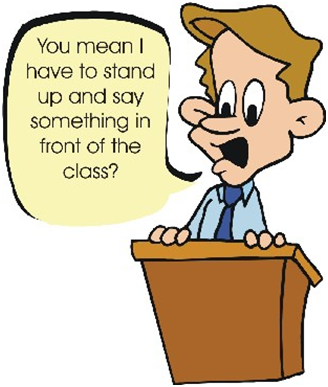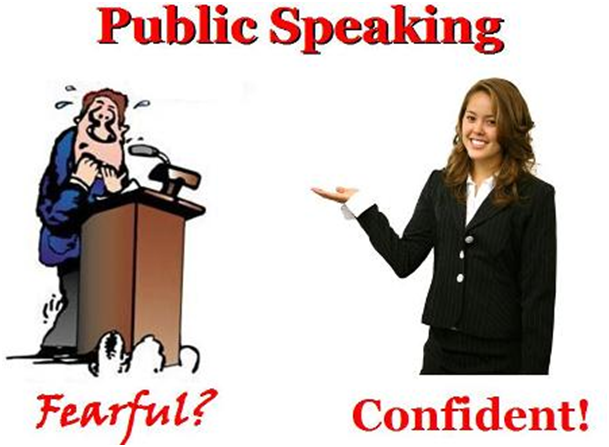How to effectively make a presentation?
There comes a moment in every one's life, when they get a chance to make a presentation. It may be during professional studies, corporate job or a social function. The success of a presentation depends on the caliber of the presenter, which includes strong command over English, the global language. Any presentation will be effective as long as it is delivered confidently, in fluent English and within a reasonable period of time.

Things to keep in mind while presenting
1. Confidence
Confidence is the key to a great presentation. It helps keep the flow of the presentation alive, avoid any instance of stammering and impress the listeners. A presentation that stutters in between will fail to catch the audience attention. You can gain the required confidence with the help of consistent practice.
2. Good preparation
Do your homework before you do any presentation. Good preparation will help you remember the key points. It is embarrassing to forget something in between a good presentation and bring the entire process to a grinding halt. A good background preparation will also help to enhance your confidence.
3. Over texting
Presentations that are loaded with text are boring. Just list down the key points and present in fluent Englsih. Make use of graphics and animations to add interest to your subject matter.
Any presentation, in order to have the maximum impact, should begin in the right way and conclude graciously.

Sample Presentation format :
A. Beginning
Get the attention of the audience from the start. Say one or two lines to divert them from their current activities. You can say: "Hello Everyone, let's get started." or "Can I have your kind attention please ?"
B. Welcome
It is very important to welcome your audience in the beginning. Without them, you won't have a presentation. Take note to welcome them warmly and politely. You can say: "Good Morning Ladies and Gentlemen, I thank you all for coming here for this presentation" or "On behalf of Infosys, I would like to welcome you all for this software presentation".
C. Introduction
Let the audience know who you are.Its the most important tenet of presentations.You can say "My name is Rohan Sharma, Senior Manager, Infosys" or "As you know, I am Rohit Bhavan, Cultural Officer of Pune University".
D. Purpose
Every presentation has a purpose. Make the audience understand why they are here and why you are on stage speaking to them. It will give them an incentive to pay attention. You can say "The purpose of our presentation is to showcase before you our revolutionary software." or "What I wish to present before you is our successful steps into redefining our
cultural activities in our college".
E. Doubts
Be clear on how you will deal with doubts during the presentation. It is natural for the audience to have questions and doubts, assure them that it will be taken care of during or after the presentation. You can say "If you have questions, I will gladly answer them during the course of our presentation." or "Any doubts will be cleared after the presentation."
F. Conclusion
It is important to conclude a presentation graciously. Do not read out a thank you note, but rather speak out from your heart. You can say " Thank you for your patient listening and hope this presentation will benefit you immensely".

The above presentation format should be followed judiciously for a great and effective presentation. Effective English communication will help you develop your presentation skills. Learn how to use English for maximum benefit with the help of an online English tutor. All the Best!
About eAgeTutor:
eAgeTutor.com is a premier online English learning institute. eAge's world class faculty and ace communication experts, from around the globe, help you to improve in an all-round manner. Assignments and tasks based on a well-researched content developed by subject matter and industry experts can certainly fetch the most desired results for improving spoken English skills. In this age of effective and advance communication technology, online spoken English programs are the most effective and convenient way to learn English.
For further information on our online English speaking courses or to experience the wonders of the virtual classroom, fix a demonstration session with our tutor.
- By Monika Agarwal
Related Topics:
2. How to Speak Clearly and Fluently ?
3. How to Communicate with New Friends ?
4. How to learn English Online ?
Dos and Don'ts of Public Speaking
 One important aspect to study while learning to improve spoken English is to understand the principles of public speaking. Most of us at some point of time in life have to speak in front of a crowd. Whether it is a presentation in your office or a project as part of your course curriculum, public speaking is a requisite. Good communication and a presence of mind help a lot in effectively delivering your message. But for people who have a doubt on their speaking skills, especially their language skills, for them nervousness is at another level. These people don't just have to overcome the stares of people but also their inner fear of English speaking.
One important aspect to study while learning to improve spoken English is to understand the principles of public speaking. Most of us at some point of time in life have to speak in front of a crowd. Whether it is a presentation in your office or a project as part of your course curriculum, public speaking is a requisite. Good communication and a presence of mind help a lot in effectively delivering your message. But for people who have a doubt on their speaking skills, especially their language skills, for them nervousness is at another level. These people don't just have to overcome the stares of people but also their inner fear of English speaking.
It is a fact that some people are natural at public speaking while some face a hard time doing it. However, it is something that we all can mend ways with. Public speaking is not confined to just your language skills, it entails your facial expressions, body language, the ease with which you communicate and a whole lot of other factors.
Let's look at the dos and don'ts that you should keep in mind before facing a group of people.
1. Basic– Dos
Be enthusiastic – Show your enthusiasm and energy.
Face the audience – Manage your presentation such that you face the audience at all times. Don't show them your back.
Speak clearly – Be loud enough that the audience gets your message even the back benchers.
2. Basic – Don'ts
Don't show your nervousness – Don't fidget with things in your hands. Make only purposeful movement and gestures.
Don't play with your slides – Either move on to next slide or stick to one you are explaining, avoid confusion with your audio-visual aid.
Don't do awkward gestures – It's a strict no-no to put your hands in the pocket. Don't have awkward hand or facial gestures that create diversion.
3. English – Dos
Define your words – Do define any word or phrase that you think the audience is not familiar with. It is important to remember that not all sitting in a group belong to the same background as you.
Be Precise and simple – Be as precise and simple when it comes to talking. Don't use complex words like "panache"; instead you can use "style or flair". Keep it as simple, and precise as possible.
4. English – Don'ts
Don't start with affirmative words – This is the first lesson in how to improve communication skills. Always start with a positive word. A lethargic start to a sentence, for instance - So, we all are gathered here to discuss on IELTS preparation, sounds dull.
Don't introduce a topic with a start like 'briefly' – When you start your topic with something like "Briefly"; it implies that the intro is redundant but still forced on the listeners. It is better to avoid such an apologetic start.
Conclusion
When you are learning to speak English, a public speaking experience would add to your learning. Speaking English fluently is one the main concerns that makes us nervous before a presentation. However, if you are well-acquainted with your topic and have structured it well, the language barrier would not be a stumbling block. Organize your presentation, giving yourself enough space to speak slowly and clearly. Don't rush with your talk and gasp for words. Practice and practice more to get your speech right. All the best!




